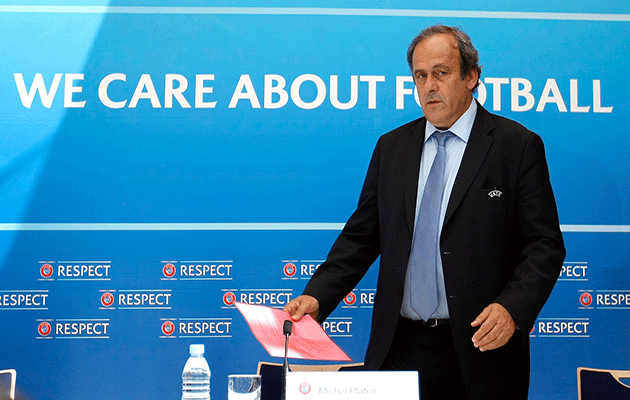Michel Platini has declared his eight-year FIFA ethics ban a “mockery” and pledged to fight it all the way through the sports and civil courts.
The French president of European federation UEFA was barred from all football activity and fined for his acceptance of a ‘disloyal payment’ of SFr2m from FIFA, authorised by Sepp Blatter, in March 2011.
The circumstances, of payment claimed to be for FIFA work nine years earlier, were considered as an ethics code breach by German judge Hans-Joachim Eckert. Platini, also a FIFA vice-president, has always protested his innocence.
In a statement, Platini denounced “a mockery” of a “verdict which is just a pathetic camouflage of a will to eliminate me from football.” He added: “In due course I will go to the civil court to claim all the damages my reputation has suffered over too many long weeks.”
He and his lawyers will now fight aggressively to have the ban overturned. While time is running short if Platini wishes to clear his name in time to stand for the FIFA presidency in February, his further target would be s safe re-emergence as UEFA president before its likely election congress at the start of June.
A statement from UEFA, noting its “disappointment” at the FIFA ethics verdict, underscored its continuing confidence in Platini’s attempts to clear his name.
Platini will probably contest the verdict on two main grounds. The one will be his already-stated concern that he did not receive a fair hearing or process; the second will be that he was only the recipient of money which was due to him and any misconduct in payment was the responsibility of Blatter alone.
The verdict was met with incredulity in French football. Federation president Noel Le Graet described it as “unbelievable” with Lyon president Jean-Michel Aulas claiming it was a deliberate manoeuvre to prevent Platini standing for the FIFA presidency.
Former France manager Raymond Domenech said the decision would not stand up in a civil court but he conceded that there was a problem over the “timing” of the payment – nine years after the work for which Platini claimed it had been due.
Should he fail with his appeals, then the 60-year-old’s fate will represent one of the greatest personal tragedies in football for many years, considering that Platini had been one of the greatest players of his era.
His popularity has endured in both his native France, where he was voted the No 1 sports personality of his generation, as well as in Italy where he was voted the greatest player ever to have lined up for Juventus.







